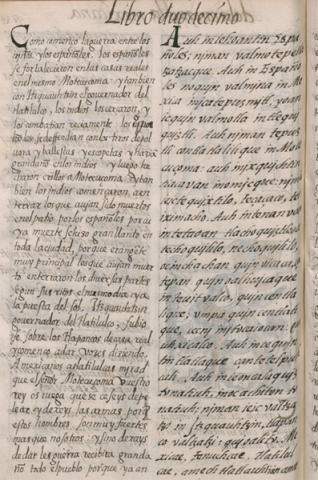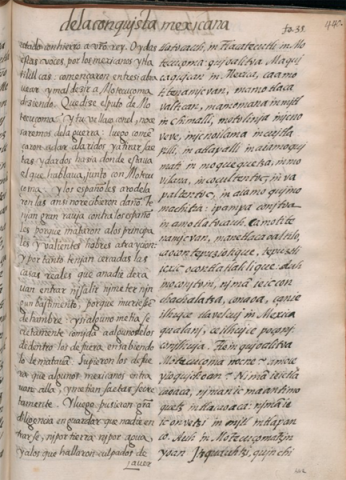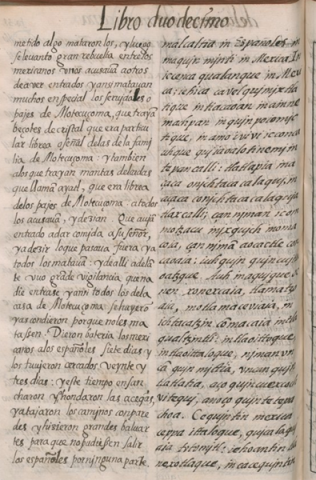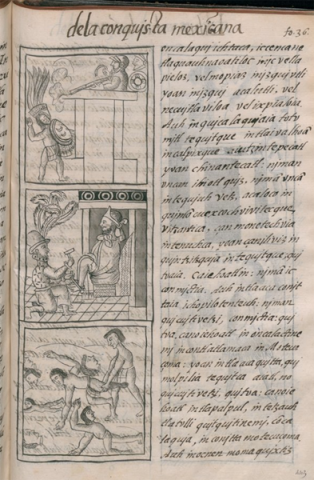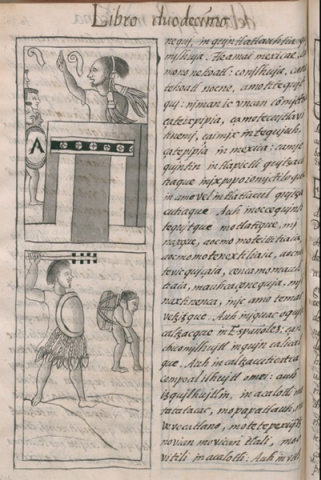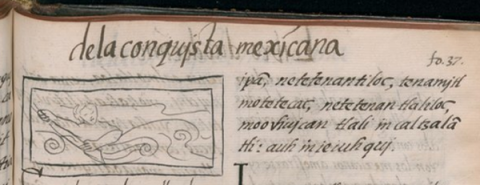 |
[Transcription of the Nahuatl (right-hand column) by James Lockhart:]
[f. 34r., cont.] Inic cempoalli oce capitulo: vncan mitoa iancuican peuhiauiotl, inic quimicalque Mexica in Españoles in nican mexico. |
[Translation of the Nahuatl (right-hand column) by James Lockhart:]
Twenty-first chapter, where it is said how the war first began, when the Mexica battled with the Spaniards here in Mexico.
[Translation of the Spanish (left-hand column) by James Lockhart:]
Chapter Twenty-one, of how the war between the Mexica and the Spaniards began in Mexico.
|
[Translation of the Nahuatl into Spanish by Fr. Bernardino de Sahagún; transcription of the Spanish (left-hand column) by James Lockhart:]
[f. 34r.] Capitulo .21. de como començo la guerra entre los mexicanos y los Españoles en mexico.
|
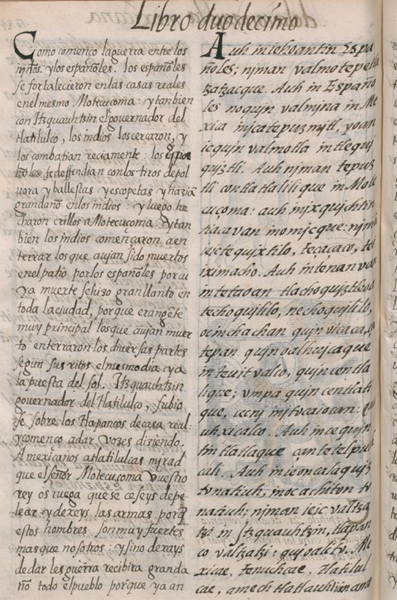 |
[Transcription of the Nahuatl (right-hand column) by James Lockhart:]
[f. 34v.] Auh in iehoantin Españoles: niman valmotepetlatzatzacque. Auh in Españoles no quinvalmina inMexica in ica tepuzmitl, yoan ic quinvalmotla in tlequiquiztli. Auh niman tepuztli contlatlalilique in Motecuçoma: auh in ixquichtin tiacavan in omicque: nimā ie ic tequixtilo, teçaçaco, teiiximacho. Auh in tenanvanin tetaoan tlachoquiztleoa techoquililo, nechoquililo, ocinchachan quinvicaca, çatepan quinoalhuicaque in Teuitvalco, quincentlalique: vmpa quincentlatique, cecni initocaiocan: Quauhxicalco. Auh in cequintin tlatlaque çan tetelpuchcali.*
Auh in ie oncalaquiz tonatiuh, in oc achiton tonatiuh:niman ie ic valtzatzi in Itzquauhtzin, tlapanco valtzatzi:quioalito. Mexicae, Tenuchcae, Tlatilulcae, amechtlatlauhtia in amo
----------
*TETELPUCHCALI. Read "tetelpuchcalli." See fol. 27v. |
[Translation of the Nahuatl (right-hand column) by James Lockhart:]
And then the Spaniards fortified themselves. From there the Spaniards shot at the Mexica with iron bolts and fired guns at them. And then they placed Moteucçoma in irons. And then all the warriors who had died were retrieved, taken to places, and identified. And wailing arose from the mothers and fathers, crying and weeping over them. First they took them to their various homes, and afterward they brought them to the temple courtyard and assembled them there. They burned them in a particular place called Quauhxicalco. But some were burned only at the various youths’ houses. And when the sun was setting, while there was still a little sunlight, then Itzquauhtzin cried out; from a roof terrace he cried out, saying, “Oh Mexica, oh people of Tenochtitlan and Tlatelolco, your ruler
[Translation of the Spanish (left-hand column) by James Lockhart:]
How the war between the Indians, and the Spaniards began: the Spaniards fortified themselves in the royal palace with Moteucçoma himself and also with Itzquauhtzin, the governor of Tlatelolco. The Indians surrounded them and battled them fiercely. The Spaniards defended themselves with artillery, crossbows, and muskets, and did the Indians great damage. Then they put Moteucçoma in irons, and also the Indians started burying those whom the Spaniards had killed in the square, for whose death a great wail went up in all the city, because those who had died were of very high rank. They buried them in different places according to their rites that same day at sunset.
Itzquauhtzin, governor of Tlatelolco, went up on the tlapancos [roof terraces] of the royal palace and began to shout, saying, "O Mexica, o Tlatelolca, consider that the lord Moteucçoma your king implores you to cease fighting and lay down your weapons, because these men are very strong, stronger than us. If you do not stop making war on them, the whole people will be greatly harmed, because they have already
|
[Translation of the Nahuatl into Spanish by Fr. Bernardino de Sahagún; transcription of the Spanish (left-hand column) by James Lockhart:]
[f. 34v.] Como començo la guerra entre los indios* y los españoles. los españoles se fortalecieron en las casas reales en** el mesmo Motecuçoma: y tanbien con Itzquauhtzin el gouernador del tlatilulco, los indios los cercaron, y los combatian reciamente: los Españoles se deffendian con los tiros de poluora y ballestas y escopetas y haziā gran daño en los indios: y luego hecharon crillos a Motecuçoma: y tanbien los indios començaron a enterrar los que auian sido muertos en el patio por los españoles por cuya muerte se dizo gran llanto en toda la ciudad, porque eran gēte muy principal los que auian muerto enterraronlos diuersas partes*** segun sus ritos el mesmo dia y a la puesta del sol.
Itzquauhtzin gouernador del Tlatilulco, subiose sobre los tlapancos de casa**** real: y començo a dar vozes diziendo A mexicanos a tlatilulcas mirad que el señor Motecuçoma vuestro rey os ruega que se ceseys***** de pelear y dexeys las armas porq̄ estos hombres son muy fuertes mas que nosotros; y sino dexays de darles guerra recibira gran daño todo el pueblo porque ya an
----------
*INDIOS. In the manuscript at this point, originally "niños" 'children' was written, and then only partly changed to "indios."
**EN. For "con."
***DIUERSAS PARTES. By the normal standards of Spanish grammar, "en" is missing before "diuersas."
****DE CASA. By normal Spanish grammar, "la" is missing between these two words.
*****SE CESEYS. This combination is not grammatical by normal standards.
|
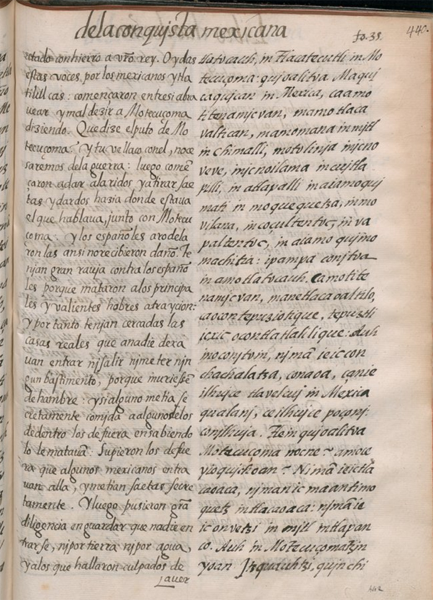 |
[Transcription of the Nahuatl (right-hand column) by James Lockhart:]
[f. 35r.] tlatocauh, in Tlacatecutli in Motecuçoma: quioalitoa. Ma quicaquican in Mexica, caamo titenamicvan, ma motlacavaltican,* ma momana in mitl in chimalli, motolinia in icnoveve, in icnoilama in cuitlapilli, in atlapalli in aiamo quimati in moquequetza, in movilana, in coçultentoc, in vapaltentoc, in aiamoquimomachitia: ipampa conitoa in amotlatocauh. Camotitenamicvan, ma netlacaoaltilo, ca ocontepuziotique, tepuztli icxic ocontlatlalilique.
Auh in oconito in, nimā ie ic conchachalatza, conaoa, çan ie ilhuice tlavelcui in Mexica qualani, ce ilhuice poçoni: conilhuia. Tlein quioalitoa Motecuçomanocne? amo ce yioquichoan?** Nimā ie ic tlacaoaca, niman ic maantimoquetz in tlacaoaca: nimā ie ic onvetzi in mitl in tlapanco. Auh in Motecuçomatzin yoan Itzquauhtzi, quinchi
----------
*MA MOTLACAVALTICAN. It is not clear where Itzquauhtzin leaves off reporting what Moteucçoma said and begins talking on his own.
**AMO CE YIOQUICHOAN. Strictly speaking, the translation given would require that the second sentence of the quote be in the second person, which it is not. An alternate translation would be "You rogue, what does Moteucçoma say, and not just one of his men?" In view of the Spanish version, possibly "one of his men" has homosexual connotations.
|
[Translation of the Nahuatl (right-hand column) by James Lockhart:]
the Tlacateuctli Moteucçoma addresses you, saying, ‘Let the Mexica hear: we are not their match, may they be dissuaded [from further fighting].’ May the arrows and shields of war be laid down. The poor old men and women, the common people, the infants who toddle and crawl, who lie in the cradle or on the cradle board and know nothing yet, are all suffering. This is why your ruler says, ‘we are not their match; let everyone be dissuaded.’ They have placed him in irons, they have put irons on his feet.”
And when he had finished saying this, the Mexica railed against him, reproaching him. They grew angry and began to fall into a ranting rage. One of them, boiling over and ranting, said to him, “What does Moteucçoma say, you rogue? Aren’t you one of his men?” Then there was a clamor, an increasing clamor, and then arrows fell on the roof. But the Spaniards held their shields over Moteucçoma and Itzquauhtzin
[Translation of the Spanish (left-hand column) by James Lockhart:]
tied your king with iron."
When the Mexica and Tlatelolca heard these shouts, they began to rage against Moteucçoma and curse him among themselves, saying, "What does this faggot Moteucçoma say? And you're a wretch along with him. We will not halt the war." Then they started giving war cries and shooting arrows and darts toward where the speaker was, together with Moteucçoma. But the Spaniards covered them with shields and they received no harm.
They were greatly enraged against the Spaniards because they killed the leaders and brave men [warriors] treacherously. Hence they kept the royal palace surrounded, letting no one go in or out or take in any provisions, so that they would die of hunger. If anyone secredy gave food to someone on the inside, when those outside learned of it they would kill him. Those on the outside learned that some Mexica were going in there, secredy taking in arrows. Then they increased their diligence in keeping watch so that no one should enter, neither by land nor by water, and those whom they found guilty of having taken something in
|
[Translation of the Nahuatl into Spanish by Fr. Bernardino de Sahagún; transcription of the Spanish (left-hand column) by James Lockhart:]
[f. 35r.] atado con hierro a v̄r̄o rey.
Oydas estas voces por los mexicanos y tlatilulcas: començaron entre si a brauear y maldezir a Motecuçoma diziendo. Que dize el puto de Motecuçoma? Y tu vellaco con el, no cesaremos de la guerra: luego comēçaron a dar alaridos y a tirar saetas y dardos hazia donde estaua el que hablaua, junto con Motecuçoma: y los españoles arodelaronlas ansi no recibieron daño.
Tenian gran rauia contra los españoles porque mataron a los principales y valientes hobres a traycion: y por tanto tenian cercadas las casas reales que a nadie dexauan entrar ni salir ni meter ningun bastimento, por que muriessē de hambre: y si alguno metia secretamente comida a algunos de los de dentro los de fuera en sabiendolo le matauā: Supieron los de fuera que algunos mexicanos entrauan alla, y metian saetes secretamente. Y luego pusieron grā diligencia en guardar que nadie entrarse,* ni por tierra ni por agua, y a los que hallaron culpados de auer
----------
*ENTRARSE. For "entrase" or "entrasse."
|
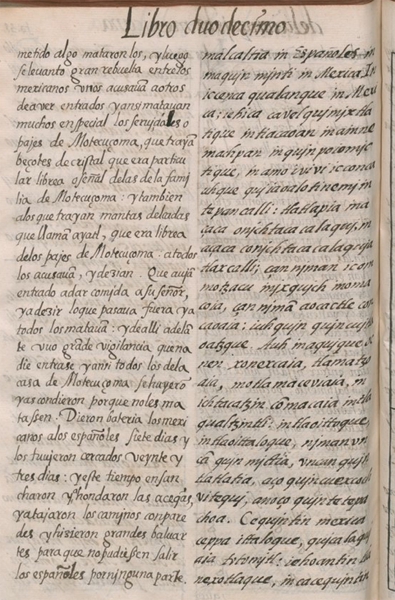 |
[Transcription of the Nahuatl (right-hand column) by James Lockhart:]
[f. 35v.] malcaltia in Españoles in ma quinminti in Mexica.
Inic cenca qualanque in Mexica; iehica ca vel quimi-xtlatique in tiacaoan in ainnemachpan in quinpoiomictique, in amo ivivi ic concauhque quiiaoalotinemi in tepancalli:* tlatlapia in açaca onichtacacalaqui, in açaca conichtacacalaquia tlaxcalli; çan niman ic ommotzacu inixquich in omacoia, çan nimā aocac tle concaoaia: iuhquin quincuitlaoatzque. Auh in aquique oc nen xonexcaia, tlamatzoaia, motlamaceviaia, in ichtacatzin cōmacaia in tlaqualtzintli: intla oittoque, intla oittaloque,niman vncā quinmictia, vncan quintlatlatia, aço quincuexcochvitequi, anoço quintetepachoa.
Cequintin mexica ceppa ittaloque, quicalaquiaia totomitl: iehoantin tlanexotlaque, in ca cequintin
----------
*TEPANCALLI. From the Spanish version and common sense it is easy to presume an error for tecpancalli 'palace', but it may be correct, as the word means "enclosure."
|
[Translation of the Nahuatl (right-hand column) by James Lockhart:]
lest the Mexica’s arrows should hit them.
The reason the Mexica were very angry was that [the Spaniards] had entirely annihilated the warriors and killed them treacherously, without warning. They did not neglect to surround the palace; they kept watch at various places where someone might enter by stealth,where someone might secretly deliver bread. Everything that had been being given to them was completely blocked off, absolutely no one delivered anything any more. It was as though they were drying out their innards. And as to those who would try to give them news and inform them, or gain their favor by giving them a bit of food, if they were seen and detected, then they killed them there, they disposed of them, by striking them on the nape of the neck or stoning them.
Once some Mexica were seen delivering arrows fitted with birds’ feathers; they let it out that some [others]
[Translation of the Spanish (left-hand column) by James Lockhart:]
they killed.
Then a great confusion arose among the Mexica, some accusing others of having gone in, so they killed many, especially the servants or pages of Moteucçoma, who wore crystal lip plugs, which were a particular livery or sign of those of Moteucçoma's family, as well as those who wore thin cloaks called ayatl, which were the livery of Moteucçoma's pages. They accused them all, saying that they had gone in to give food to their lord and tell what was happening outside, and they killed them all. From then on there was great vigilance that no one should enter. And so all those of Moteucçoma's house fled and hid so they would not be killed.
The Mexica assaulted the Spaniards for seven days and kept them surrounded for twenty-three, and during this time they widened and deepened the canals and blocked the roads with walls, and made great bulwarks so that the Spaniards would not be able to get out anywhere.
|
[Translation of the Nahuatl into Spanish by Fr. Bernardino de Sahagún; transcription of the Spanish (left-hand column) by James Lockhart:]
[f. 35v.] metido algo mataronlos,
y luego se lauanto gran rebuelta entre los mexicanos vnos acusauā a otros de aver entrados* y ansi matauan muchos en special** los seruiçiales o pajes de Motecuçoma, que trayā beçotes de cristal que era particular librea o señal de las*** de la familia de Motecuçoma: y tambien a los que trayan mantas delcadas que llamā ayatl, que era librea de los pajes de Motecuçoma: a todos los acusauā, y dezian. Que auiā entrado a dar comida a su señor, y a dezir lo que pasaua fuera y a todos los matauā: y de alli adelāte vuo grāde vigilancia que nadie entrase y ansi todos los de la casa de Motecuçoma se huyerō y ascondieron por que no les matassen.
Dieron bateria los mexicanos a los españoles siete dias y los tuuieron cercados veynte y tres dias: y este tiempo ensancharon y ahondaron las aceq̓as, y atajaron los caminos con paredes y hizieron grandes baluartes para que no pudiessen salir los españoles por ninguna parte.
----------
*ENTRADOS. Normal grammar would demand "entrado."
**SPECIAL. Spanish writing of the sixteenth century sometimes elided e before sp, as in the frequently seen "Spaña."
***LAS. For "los."
|
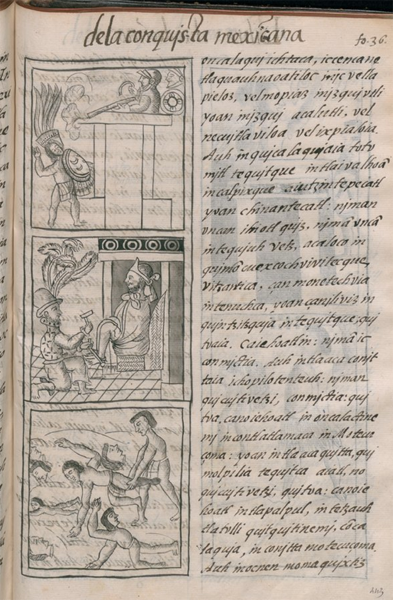 |
[Transcription of the Nahuatl (right-hand column) by James Lockhart:]
[f. 36r.] oncalaqui ichtaca, ic cenca netlaquauhnaoatiloc inic vellapieloz, vel mopiaz in izqui vtli yoan in izqui acalutli, vel necuitlaviloa vel ixpialoia. Auh in quicalaquiaia totomitl tequitque intlaivalhoā in calpixque aiutzintepecatl yoan chinantecatl: niman vncan ihiotl quiz, nimā vncā intequiuh vetz, acaloco in quimōcuexcochvivitecque, vitzantica,
çan monetechvia in tenuchca, yoan çan iliviz in quintzitzquia in tequitque; quitoaia. Ca iehoatl in: nimā ic conmictia. Auh intla aca conittaia ichopilotenteuh: niman quicuitivetzi, conmictia: quitoa, ca no iehoatl inoncalactinemi in contlatlamaca in Motecuçoma: yoan intla aca quitta, quimolpilia tequitcaaiatl, no quicuitivetzi, quitoa: ca no iehoatl in tlapalpul, in tetzauhtlatolli quitquitinemi, cōcalaquia, in conitta motecuçoma. Auh in oc nen momaquixtiz
|
[Translation of the Nahuatl (right-hand column) by James Lockhart:]
were secretly getting in. Therefore strict orders were given that good watch should be kept, that each road and canal should be well guarded. Great care was taken to keep a good lookout. And those who had taken in the arrows were doing their duty, sent by the stewards of Ayotzintepec and Chinantlan. Then and there they took their last breaths, their task came to a conclusion. At the canal they struck them on the napes of their necks with heavy pointed sticks.
There was internal strife among the Tenochca, and it was without reason that they seized those who were performing duties, saying, “This is the one," and then killing him. And if they saw a crystal lip plug on someone, they hastened to seize him and killed him, saying,“He too is one of those who go inside and give provisions to Moteucçoma.” And if they saw someone who had tied about him a thin tribute worker’s cloak, they hurried to seize him too, saying, “This is another wretched fellow who goes about carrying scandalous and harmful tales, who takes them in to Moteucçoma when he goes to see him.” And he who would try to save himself
[Translation of the Spanish (left-hand column) by James Lockhart:]
(intentionally blank)
|
[Translation of the Nahuatl into Spanish by Fr. Bernardino de Sahagún; transcription of the Spanish (left-hand column) by James Lockhart:]
[f. 36r., tres dibujos; sin texto en español]
|
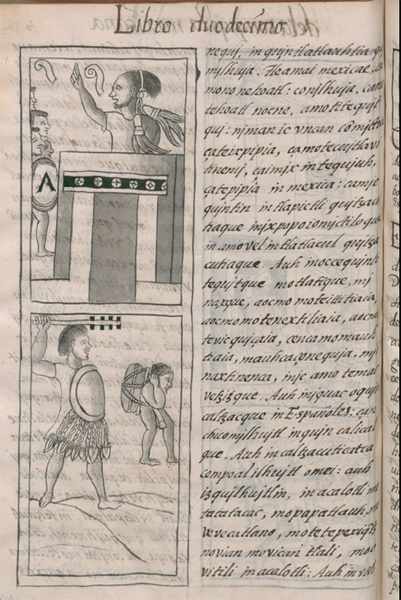 |
[Transcription of the Nahuatl (right-hand column) by James Lockhart:]
[f. 36v.] nequi, in quintlatlauhtia: quimilhuia. Tle amai mexicae, camo no nehoatl: conilhuia, ca no tehoatl nocne, amo titequitqui:niman ic vncan cōmictia ça teixpipia, ça motecuitlavitinemi, ça imix intequiuh, ça tepipia in mexica: ca miequintin in tlapictli quitzacutiaque in ixpopoiomictiloquein amo vel intlatlacul quitzacutiaque. Auh in oc cequintitequitque motlatique, minaxque, aocmo moteittitiaia, aocmo motenextiliaia, aocmo tevic quiçaia, cenca momauhtiaia, mauhcaçonequia, miinaxtinenca, inic amo temac vetzizque.
Auh in iquac oquincaltzacque in Españoles: çanchicomilhuitl in quincalicalque. Auh in caltzacuticatca cempoalilhuitl omei: auh izquilhuitl in, in acalotli mo-tatatacac, mopapatlauh, movevecatlano, motetepexiq̄tz novian movicantlali, moovitili in acalotli: Auh in vtli
|
[Translation of the Nahuatl (right-hand column) by James Lockhart:]
would implore them, saying, “Oh Mexica, what are you doing? I am not one of them.” They told him, “You are one of them, you rogue, you are not doing duty.” Then and there they killed him. They were just keeping watch on everyone, going about being careful about everyone; they kept their eyes peeled, the Mexica just watched everyone. They punished many for invented things, who were treacherously killed; they punished them for wrong doings not their own. And others doing duty work hid themselves, went to shelter, no longer showed themselves to anyone nor let themselves be seen, no longer came out among people. They were greatly afraid, limp with fear; they went about taking refuge so that they would not fall into someone’s hands.
And when they had the Spaniards closed in their buildings, they fought them for only seven days. They were shut in for twenty-three days, and during each of these days the canals were excavated, widened, deepened, and the sides made steeper. Everywhere the canals were made more difficult to pass. And on the roads,
[Translation of the Spanish (left-hand column) by James Lockhart:]
(intentionally blank)
|
[Translation of the Nahuatl into Spanish by Fr. Bernardino de Sahagún; transcription of the Spanish (left-hand column) by James Lockhart:]
[f. 36v., dos dibujos; sin texto en español]
|
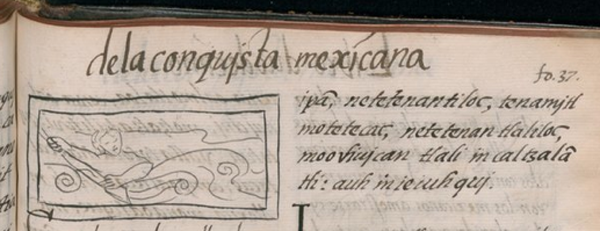 |
[Transcription of the Nahuatl (right-hand column) by James Lockhart:]
[f. 37r.] ipā, netetenantiloc, tenamitl motetecac, netetenantlaliloc, mooviuicantlali in caltzalātli:
auh in ie iuhqui.
|
[Translation of the Nahuatl (right-hand column) by James Lockhart:]
various walls were built, walls were laid here and there. Walls were set up and the passageways between houses made difficult.
And when this was done . . .
[Translation of the Spanish (left-hand column) by James Lockhart:]
(intentionally blank)
|
[Translation of the Nahuatl into Spanish by Fr. Bernardino de Sahagún; transcription of the Spanish (left-hand column) by James Lockhart:]
[f. 37r., un dibujo; sin texto en español]
|

